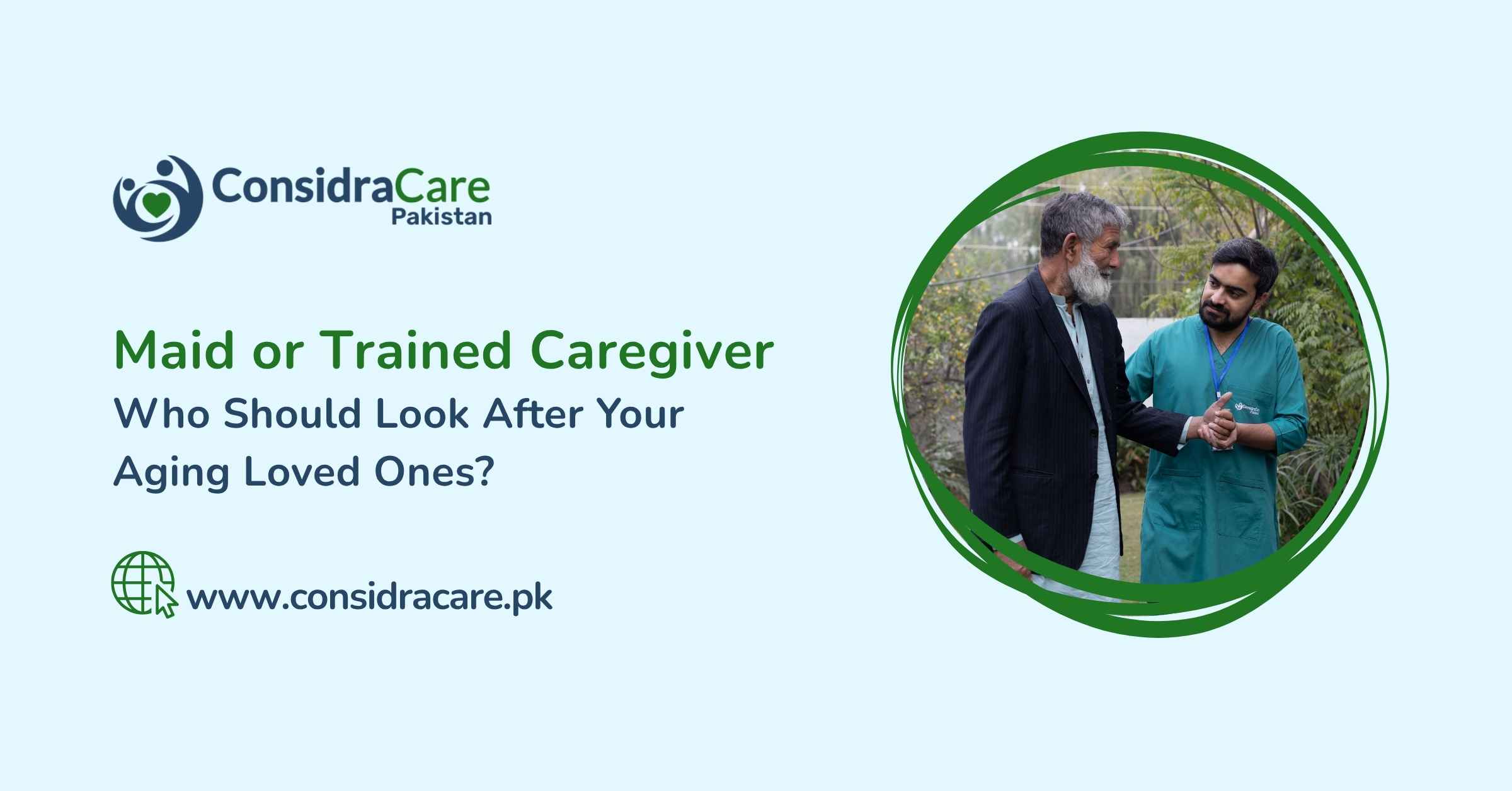Many families still hire maids when they need an extra hand in caring for their aging loved ones. This is primarily because they aren’t fully aware of the care choices available. And even when they are, they often don’t have a clear understanding of how other elder care options might be a better alternative.
In this article, we will look at who among the maids and trained caregivers is better suited to care for your aging parent. We’ll also explain how ConsidraCare offers a more reliable way to support your loved ones at home.
Who Should Look After Your Aging Parent?
Here are some aspects which might convince you that trained caregiver is better option to care for your loved one.
1. Medical Proficiency:
If you have an aging loved one, the person caring for them must understand their medical needs, which can range from basic to advanced depending on their health. Trained caregivers have the right knowledge and skills to manage medicines, check vitals, and take notes of unusual symptoms.
They also help with mobility, assisting your elderly parent to get in and out of bed safely and use walking aids properly. This kind of care is not just about help; it’s about keeping your loved one safe and comfortable.
On the other hand, domestic maids usually do not have professional medical training. This means they might not know how to respond in an emergency or follow important medical instructions. Without this knowledge, your loved one’s health could be at risk.
2. Professionalism:
Caregiving is a job that requires proper training and a serious sense of responsibility. Caregivers know how to speak politely, show respect, keep the elder’s space clean, and follow routines properly. They are expected to behave in a professional way, not just as helpers, but as people trusted with someone’s health and dignity.
Maids usually don’t see themselves in the same role. They may not follow a proper care routine, and they may lack the understanding of how to set boundaries, maintain hygiene, or handle sensitive situations respectfully. That doesn’t mean they’re careless just that they haven’t been trained for this kind of care.
3. Kindness and Compassion:
Kindness and compassion are not just human values, they are essential qualities in caregiving. Trained caregivers bring these qualities into their work, which helps them build a strong bond with the elder they are caring for. They listen with patience, understand unspoken concerns, and create a safe space where your loved one can express feelings they may not even share with family.
On the other hand, a domestic maid may not be emotionally involved in your loved one’s concerns or feel personally connected to their role. This often comes from a lack of education and formal training. Trained caregivers, however, are taught to approach their work with empathy, patience, and emotional understanding.
4. Enduring and Handling Stress:
When your loved one faces a difficult situation, such as a fall, it can be very stressful for everyone. A person without training might feel scared and unsure how to react. Trained caregivers, however, know how to stay calm and focused. They calmly handle the situation and use helpful techniques to reduce stress, providing comfort and safety. Moreover, caregivers are required to have CPR training which can be helpful in case of medical emergencies.

If your loved one only needs help with daily activities or basic medical care, it might feel easier to just assign these tasks to a maid. But that’s a short-term fix.
These situations still demand a certain level of training, awareness, and emotional care. A trained caregiver knows how to assist without causing injury, how to encourage independence with dignity, and how to keep an elder engaged and supported. Above all, trained caregivers bring peace of mind for you, reducing your daily hassle and offering a long-term solution.
How ConsidraCare Delivers Reliable Care at Your Loved One’s Home?
ConsidraCare offers you the reliable care through three categories.
- Health Companion
- Medical Attendant
- Skilled Nurse
Instead of hiring a maid, ConsidraCare gives you better alternative. For example, our health companions can assist with medication, check vital signs, help with light housekeeping, and provide personal support. They can do almost everything a maid can but with one major difference: they are trained to understand your loved one’s health and respond to it properly.
These care options allow you to choose the right level of support based on your loved one’s needs whether they need help with daily activities or more advanced medical care. This approach not only gives you flexibility but also helps you manage care within your budget.
Final Thoughts:
Choosing the right care for your aging parent is a decision that impacts their safety, comfort, and happiness. While maids can provide some basic help around the house, they often lack the medical knowledge, emotional support, and professionalism that trained caregivers offer. Caregivers are specially trained to take care of different health needs, provide compassionate care in the comfort of home.
FAQ’s
1. Is it more cost-effective to hire a maid instead of a caregiver?
Hiring a maid might seem more affordable initially; however, caregivers provide specialized services that address both daily living and health-related needs. Investing in a caregiver can prevent potential health complications, reduce hospital visits, and enhance the overall quality of life for your loved one.
2. Do caregivers assist with household chores?
Yes, caregivers often help with light housekeeping tasks related to the individual’s care, such as tidying up, preparing meals, and doing laundry. However, it’s important to note that some caregivers are skilled nurses, and their primary responsibility is to manage advanced medical needs.
3. What qualifications should I look for when hiring a caregiver?
When hiring a caregiver, consider their certifications in elderly care, first aid, and CPR. Additionally, experience in handling specific medical conditions relevant to your loved one’s needs can be beneficial.



